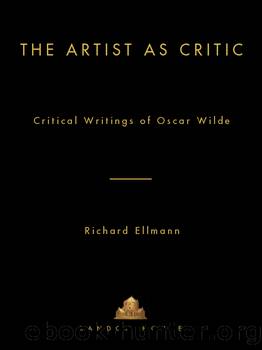The Artist As Critic by Richard Ellmann

Author:Richard Ellmann [Ellmann, Richard]
Language: eng
Format: epub
ISBN: 978-0-307-82913-9
Publisher: Random House Publishing Group
Published: 2012-12-05T00:00:00+00:00
*Review of Chuang TsÅ, translated from the Chinese by Herbert A. Giles, Speaker I : 6 (8 February 1890) 144â46.
Mr. Paterâs Last Volume [Appreciations]*
When I first had the privilegeâand I count it a very high oneâof meeting Mr. Walter Pater, he said to me, smiling, âWhy do you always write poetry? Why do you not write prose? Prose is so much more difficult.â
It was during my undergraduate days at Oxford; days of lyrical ardours and of studious sonnet-writing; days when one loved the exquisite intricacy and musical repetitions of the ballade, and the villanelle with its linked long-drawn echoes and its curious completeness; days when one solemnly sought to discover the proper temper in which a triolet should be written; delightful days, in which, I am glad to say, there was far more rhyme than reason.
I may frankly confess now that at the time I did not quite comprehend what Mr. Pater really meant; and it was not till I had carefully studied his beautiful and suggestive essays on the Renaissance that I fully realised what a wonderful self-conscious art the art of English prose-writing really is, or may be made to be. Carlyleâs stormy rhetoric, Ruskinâs winged and passionate eloquence, had seemed to me to spring from enthusiasm rather than from art. I donât think I knew then that even prophets correct their proofs. As for Jacobean prose, I thought it too exuberant; and Queen Anne prose appeared to me terribly bald, and irritatingly rational. But Mr. Paterâs essays became to me âthe golden book of spirit and sense, the holy writ of beauty.â They are still this to me. It is possible, of course, that I may exaggerate about them. I certainly hope that I do; for where there is no exaggeration there is no love, and where there is no love there is no understanding. It is only about things that do not interest one, that one can give a really unbiassed opinion; and this is no doubt the reason why an unbiassed opinion is always absolutely valueless.
But I must not allow this brief notice of Mr. Paterâs new volume to degenerate into an autobiography. I remember being told in America that whenever Margaret Fuller wrote an essay upon Emerson the printers had always to send out to borrow some additional capital âIâs,â and I feel it right to accept this transatlantic warning.
âAppreciations,â in the fine Latin sense of the word, is the title given by Mr. Pater to his book, which is an exquisite collection of exquisite essays, of delicately wrought works of artâsome of them being almost Greek in their purity of outline and perfection of form, others mediæval in their strangeness of colour and passionate suggestion, and all of them absolutely modern, in the true meaning of the term modernity. For he to whom the present is the only thing that is present, knows nothing of the age in which he lives. To realise the nineteenth century, one must realise every century that has preceded it, and that has contributed to its making.
Download
This site does not store any files on its server. We only index and link to content provided by other sites. Please contact the content providers to delete copyright contents if any and email us, we'll remove relevant links or contents immediately.
The Power of Myth by Joseph Campbell & Bill Moyers(1068)
Half Moon Bay by Jonathan Kellerman & Jesse Kellerman(987)
A Social History of the Media by Peter Burke & Peter Burke(985)
Inseparable by Emma Donoghue(983)
The Nets of Modernism: Henry James, Virginia Woolf, James Joyce, and Sigmund Freud by Maud Ellmann(912)
The Spike by Mark Humphries;(811)
The Complete Correspondence 1928-1940 by Theodor W. Adorno & Walter Benjamin(788)
A Theory of Narrative Drawing by Simon Grennan(781)
Culture by Terry Eagleton(775)
Ideology by Eagleton Terry;(742)
World Philology by(719)
Farnsworth's Classical English Rhetoric by Ward Farnsworth(715)
Game of Thrones and Philosophy by William Irwin(712)
Bodies from the Library 3 by Tony Medawar(709)
High Albania by M. Edith Durham(704)
Adam Smith by Jonathan Conlin(693)
A Reader’s Companion to J. D. Salinger’s The Catcher in the Rye by Peter Beidler(688)
Comic Genius: Portraits of Funny People by(652)
Monkey King by Wu Cheng'en(652)
